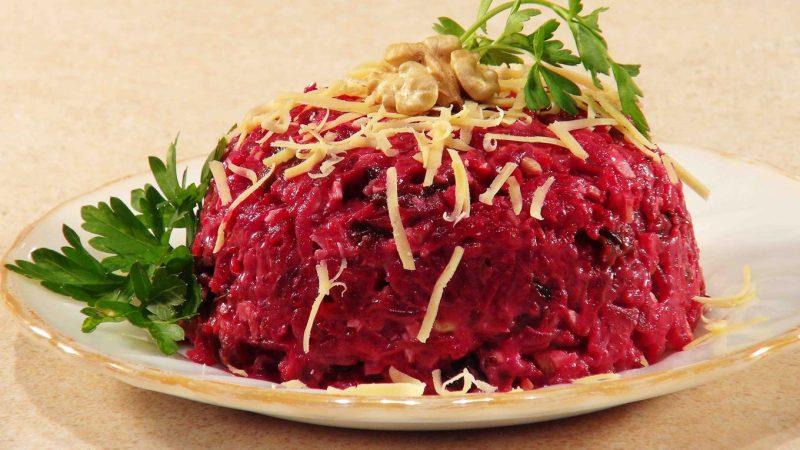Is it possible to eat beets if you have gout: let’s look at the pros and cons
Most diseases require not only drug treatment, but also adherence to a certain diet. Gout is no exception. Patients with gouty arthritis are interested in whether they can eat such a healthy and vitamin-rich vegetable as beets.
Let's consider the benefits of beets for gout, how to prepare them and when it is better to exclude them from the diet.
Is it possible to eat beets if you have gout?

There is a lot of controversy about the use of beets for gout. To find out whether it can be included in the diet or not, we will first look at what kind of disease it is, how to fight it and whether beets are useful in curing it.
Gout – a chronic disease characterized by excessive protein breakdown and the inability of the kidneys to remove uric acid. The result is the deposition of urate crystals - salts - in tissues and joints. To prevent relapses and progression of the disease, patients need proper and balanced nutrition.
Beets are a storehouse of vitamins and minerals and have many beneficial properties. Beets are rich in vitamins PP, P and group B, as well as amino acids such as betaine, arginine, histidine, micro- and macroelements - iron, manganese, rubidium, folic acid, sulfur, iodine, fiber.
Beetroot has a variety of effects on the human body:
- improves the health of the gastrointestinal tract;
- restores the natural intestinal microflora;
- helps normalize heart function;
- increases immunity;
- strengthens cartilage and bones;
- relieves anxiety, calms the nervous system;
- removes waste, toxins and excess fluid.
Thanks to the huge number of positive properties, the vegetable is indispensable for the diet. However, in case of gout, its use must be strictly controlled as it has undesirable effects on patients.
Arguments for
The main arguments of doctors who advise consuming vegetables to prevent gout:
- due to its diuretic effect, it promotes increased outflow of uric acid salts;
- boron in the root vegetable strengthens joint tissue and prevents the development of urolithiasis;
- relieves pain and swelling.
Against
Doctors recommend caution in including beets in the diet if you have concomitant diseases:
- diabetes mellitus;
- frequent diarrhea;
- low pressure;
- inflammatory processes of the gastric mucosa;
- metabolic disorders with the formation of insoluble sediment;
- hypokalemia.
Read also:
Not a waste, but a source of vitamins: how beet tops are useful and how they can be used.
Does beet juice help with a runny nose and how to prepare natural drops for children.
Beetroot juice for sinusitis: choose a recipe and use it correctly.
Benefits of beets for gout

Saturation with beneficial vitamins and minerals is not the main function of root vegetables for gout, although its consumption generally has a positive effect on the body. An important property is considered to be a diuretic effect. The uric acid salts accumulated in the joints are gently removed thanks to beets.
At the same time, containing a large amount of boron strengthens joints and prevents the development of arthritis. The latter is possible due to the production of parathyroid hormones, which is stimulated by boron. Beetroot is a means of preventing urolithiasis, which is what provokes gout.
Health benefits will come from root lotions, which act as an analgesic and antiseptic. To do this, grind the beets with a blender and apply to the affected joints.
Important! An excess of boron in the body can cause significant harm to health: in large quantities it is toxic. Beets should not be overused.
How to use it correctly
To the people Those suffering from gout are advised to eat root vegetables after heat treatment. It is baked, boiled, steamed. The daily consumption rate is 150 g. Juice is obtained from the fresh product, which must be diluted with water 1:1 before use (in concentrated form it has a strong diuretic effect).
Reference! Beetroot juice is diluted not only with water, but also with other juices. At the same time, the benefits of the product will increase.
Variations of dishes with beets are varied: they prepare borscht, stew, baked with potatoes.
Dietary recipes with beets
Here are recipes for dishes allowed for patients with gout.
Warm salad

Ingredients:
- beets – 0.5 kg;
- potatoes – 0.25 kg;
- garlic – 3 cloves;
- vegetable oil – 2 tbsp. l.;
- a pinch of salt.
Preparation:
- Grind the vegetables on a coarse grater.
- Place in a plate, season with oil.
- Squeeze the garlic and add salt.
Advice. Do not overuse salt, as it retains fluid in the body and disrupts the exchange of purine bases.
Vegetarian borscht

Ingredients:
- beet – 0.2 kg;
- carrots – 50 g;
- onion – 50 g;
- potatoes – 0.2 kg;
- cabbage – 0.2 kg;
- fresh tomato – 0.1 kg;
- sour cream – 30 g;
- greens to taste.
Preparation:
- Boil the beets and grate them.
- Cut all other vegetables into strips.
- Place all ingredients in a saucepan and add water.
- Cook over low heat until done.
- Place into serving bowls, add sour cream and herbs.
Contraindications and harm
Harm to the body can be caused by uncontrolled consumption of vegetables. Oxalic acid, which is found in large quantities in beets, promotes the breakdown of uric acid and the excretion of urates through the kidneys. But if the kidneys do not work properly, salts will be deposited in the joints and provoke a relapse of the disease.
The urea content in the root crop also has an adverse effect on the kidneys. Doctors who prescribe beets for the treatment of urolithiasis are making a mistake. In reality, this will aggravate the course of the disease and can cause irreparable harm to the body.
Conclusion
You can include beets in your diet for gout, but in small quantities. On average, 150 g of root vegetables is enough. Important condition: the product must undergo heat treatment before use. To preserve all the beneficial properties, cook it unrefined.
Before consumption, in any case, it is important to consult a specialist, to rule out diseases and pathological conditions in which beets are undesirable.